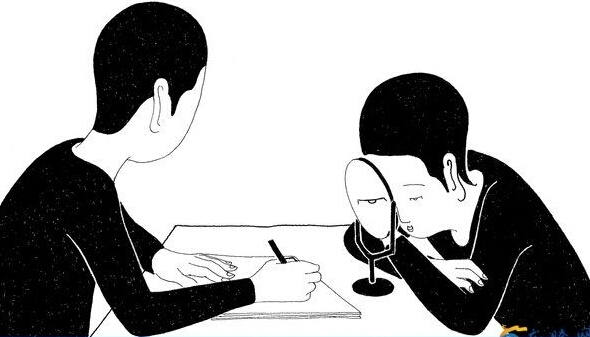(单词翻译:单击)
HONG KONG — A FEW years back I got a callfrom a film director based in China who had read one of my detective novels."Can you help me write a screenplay for a crime story?" he asked. "The tricky thing is that it's set in Beijing, so no crime can be involved."
香港——几年前我接到一位在中国发展的导演的电话,他读了我的一部侦探小说,问我:“你能给我写一个犯罪故事的剧本吗?”然后他又说道,“麻烦的是因为要设定在北京,所以不能出现犯罪。”

Welcome to the world of screenwriting for China, where crime stories are crime free, ghost tales have no ghosts and crooked politicians can't be crooked.
China has a large film industry and thesecond-biggest box office in the world, but few people outside the country have ever watched a Chinese movie released there: Once you've seen one acrobatichero single-handedly dispatch an enemy platoon, you've seen a lifetime's worth. For that, you can blame the rules of film censorship in China, and a Chinese government extremely sensitive about how the nation is portrayed.
这就是中国的剧本创作了。犯罪片不能有犯罪,鬼故事不能真有鬼,奸诈政客也不能真的奸佞邪恶。
中国已经建立了庞大的电影工业,还是全球第二大市场,但是中国以外的观众很少会看到在海外播放的中国电影——如果你在影院里曾看到某个武打明星单手逼退敌人,那简直是一生难得的记忆了。究其原因,可以归结到中国的电影审查制度,以及中国政府对于电影里中国形象的极度敏感。
No one can start making a film in China without submitting the plot to the State General Administration of Press, Publication,Radio, Film and Television (SGAPPRFT), an agency set up to administer government-owned media but best known (and feared) as a committee of censors.If any organization from outside mainland China is involved, including Hong Kong partners, a full screenplay must be submitted for review. Once approved,it can't be modified, meaning actors and directors must resist any urge to improvise during filming.
At irregular intervals the agency providesa list of unmentionables. Sex scenes or depictions of "excessive drinking,smoking and other bad habits" are a no-go. “Propagating passive or negative outlook on life, world view and value system" is banned; so is "stirring upambivalence and conflicts between different religions or sects, and betweenbelievers and nonbelievers, causing disharmony in the community."
如果你想在中国拍片,就必须先把情节呈交给国家新闻出版广播电影电视总局(SGAPPRFT)。广电总局乍一看好像是个监管国有媒体的机构,其实一般被当做“审查委员会”看待,是个让人闻之色变的存在。如果中国大陆以外的组织也参与其中,包括香港的合作伙伴,那么整个剧本都要呈上供大人御览。如果被批准了,这剧本也就不能再修改了,因而演员和导演不管再怎么想,也不能在拍戏过程中即兴发挥。
广电总局曾发布一份“不能说”的名单。性爱场景,以及对“酗酒、吸烟和其他坏习惯”的描绘不宜出现。“传播被动或消极的人生观、世界观和价值观”是被禁的。至于“挑起宗教或教派,信徒和非信徒之间的冲突和矛盾,破坏社会和谐”的,自然也是不许了。
The vetting committee might reject a storyline for being "unscientific," because, say, it features time travel. It also bans"historical untruths," which, this being China, often means historical truths.
The ethnicity of villains is a major concern as well. "If it's about international crime, the bad guy must not be Chinese," explained a Hong Kong screenwriter with 25 years' experience. (Heasked not to be identified for fear of being blacklisted.) Further more, thecrime must not be initiated within China's borders, as if the land itself were somehow pure. All characters in the uniformed services must be good guys.Government employees may never be corrupt. There are no prostitutes in China.
Getting a SGAPPRFT permit is just the firsthurdle. If the hero is a monk or the setting is a temple or a church, the script will also require a permit from the State Administration for Religious Affairs. If it's a spy movie, national security agents will have to vet it. Forcop shows, you need approval from the police's so-called art department.
Ghost stories are farcically problematic.In the spring of 2006, an online novel by Zhang Muye called "Gui Chui Deng"(literally "Ghost Blows Out the Light") was enormously popular. It was read by millions. There was much excited discussion about a print version and aninternational movie adaptation. Then the project stalled. The government-licensed version of the book published in print was purged of any reference to thesupernatural, and with that, the film project vanished, too.
审查委员会们会因为影片有时空穿越成分,判定它“不科学”而把剧本打回去;他们也不允许“不符合历史”的故事,因为既然是在中国,就应该都是史实。
反派的种族也是个大问题。“如果涉及到跨国犯罪,反派一定不能是中国人,”一位有着25年从业经验的香港编剧说道(他请求笔者不要写出他的名字,以免进黑名单)。此外,犯罪也不可发生于中国国内,要把这片土地默认是一清二白才好。在国家机关工作的都得是好人,政府职员不能涉贪,中国也没有妓女。
得到广电总局的许可还只是第一步。如果主角是个和尚,或是故事背景设在寺庙和教堂,那你还要征得国家宗教事务局的许可。如果是间谍片儿,还要让国家安全局审查。如果是警匪片,你还要得到警团所谓的文艺部的准许。
鬼故事也要搞成开放式结局,往往让人有“玩我呐!”之感。2006年春,由张牧野所写的一部网络小说《鬼吹灯》取得了巨大轰动,一时间读者能以百万计。关于此书的实体出版和改编电影走向国外的相关讨论也是叫嚣尘上。然后就没了。整个计划就此搁置。在《鬼吹灯》经国家审批后的出版版本中,书中一切涉及超自然的成分都被剔除了,而没了这些,电影自然也没法拍了。
At least half of Hong Kong movies today areco-produced with mainland organizations, and screenwriters here are also having to toe the Beijing line. "That's why we usually make 'ancient swordsman' films,or stories that happen in the period before the founding of the New China," the Hong Kong screenwriter explained. He meant that you can show something negativein mainland China only so long as it happened before the Communist revolutionin 1949 — but be careful not to portray that period as a golden era, because for that you might get censored.
Can a good story be written under suchconditions? It's difficult. Some screenwriters have managed through cunning:One director squeaked a crime movie set in Hong Kong past the censors afterclaiming the action took place before the transfer in 1997, while the territory was still under the rule of those evil Brits.
今天至少一半的香港电影都是与大陆的合拍片,而剧本自然也就不得不向广电总局的标准靠拢。“所以我们总是拍古装武侠片,或者是新中国成立以前那段时期的片子。”这位香港编剧解释道。也就是说,只要是新中国以前,展现那个时代中国大陆的阴暗面也是可以的,但要千万注意不可把那个时代描绘的太好,跟什么黄金时代似的,不然审查又是一个麻烦。
在这样的条件下能写出好剧本吗?很难。有些编剧就想出了各种歪主意:曾有位导演拍了部设定在香港的犯罪片,然后称这个故事发生于1997年之前——那时香港不还是被邪恶的大英帝国统治嘛。于是就过审了。
More often, the rules kill creativity. The 2002 Hong Kong movie "Infernal Affairs," a gripping tale about a triad member who infiltrates the police, was remade in Hollywood as "The Departed,” which won four Oscars, including one for best adapted screenplay. In the original,the gangster antihero ultimately avoids being exposed by killing someone in his own gang. Is he still faking it, or has he become the top cop he was pretending to be? In the version of the film that was reshot in China, the ending is a clunker:Confronted by police officers who accuse him of being a mole, he turns in his badge without a word.
That crime story I co-wrote with theChinese director had to be rejiggered multiple times. It eventually resulted inan implausible tale about an Italian businessman who flies into Beijing, stealsa huge cache of art treasures, and flies out while pursued by noble detectives of Chinese origin. It was never filmed, to my relief.
The problem is not about to go away.According to Xinhua, the state-run news agency, China's uncompromising president, Xi Jinping, told a forum of writers in October, "The arts must serve the people and serve socialism." Anthony Lee, a Hong Kong Polytechnic University lecturer on entertainment, said, "The buzz in theindustry is that the toughness of China's new leader is making things harder,not easier."
但除了这种曲线救国般的点子,审查制度更多的时候还是扼杀了从业人员的创造力。2002年香港电影《无间道》堪称是一部扣人心弦的片子,讲述了三合会与警方相互潜伏的故事,还被好莱坞拿去拍了《无间道风云》,翻拍版还赢得了四项奥斯卡奖,包括最佳改编剧本奖。在原版电影中,出身黑帮的反英雄主角杀掉了同样来自黑帮的某人,从而避免了自己的身份被暴露。那么他是仍旧在假装,还是已经认同了他一直所扮演的顶级警官的角色呢?而在经过特地补拍的大陆版中,这份悬念就灰飞烟灭了:结局被改成了警员们怒指他是间谍,而他一言不发地上交了自己的警徽。
我和中国导演合写的那个剧本,在经过多次修订之后终于变成了这样一个故事:一位意大利商人飞到北京,盗走了艺术珍宝,然后在逃跑的过程中被中国出身的高尚的警探追击。这个故事我自己都看得蛋疼,谢天谢地,它一直没被拍成电影。
如今这个问题还没有解决的迹象。根据中国国有媒体新华社的报道,领导人习圌近圌平在10月份的文艺座谈会上强调道,“文艺要坚持为圌人圌民圌服圌务、为社会主义服务这个根本方向”。香港理工大学的娱乐业讲师Anthony Lee说道,“业界现在有一种声音,认为中国新任领导人的强硬态度没让事情变得更容易,反而更加艰难了。”
Screenwriters may find some hope in thefact that in the long run the Chinese public, and investors, will demand global standards of story writing. On a domestic airline in China recently, I notedthat a movie showing a lone Chinese hero defeating a Japanese horde was playingon drop-down screens. Not one passenger seemed to be watching it. Instead many were watching Hollywood films on portable devices.
但是,或许仍有一件事能让编剧们看到些许希望:长远来看,中国的观影大众和投资者们总有一天会要求国际水平的影视剧本。最近在中国国内的航班上,我注意到飞机下拉屏幕上在播一部中国孤胆英雄暴打日本鬼子的电影,但是放眼望去好像一个看的人都没有。反而有不少乘客,在用便携式设备看好莱坞的电影。


